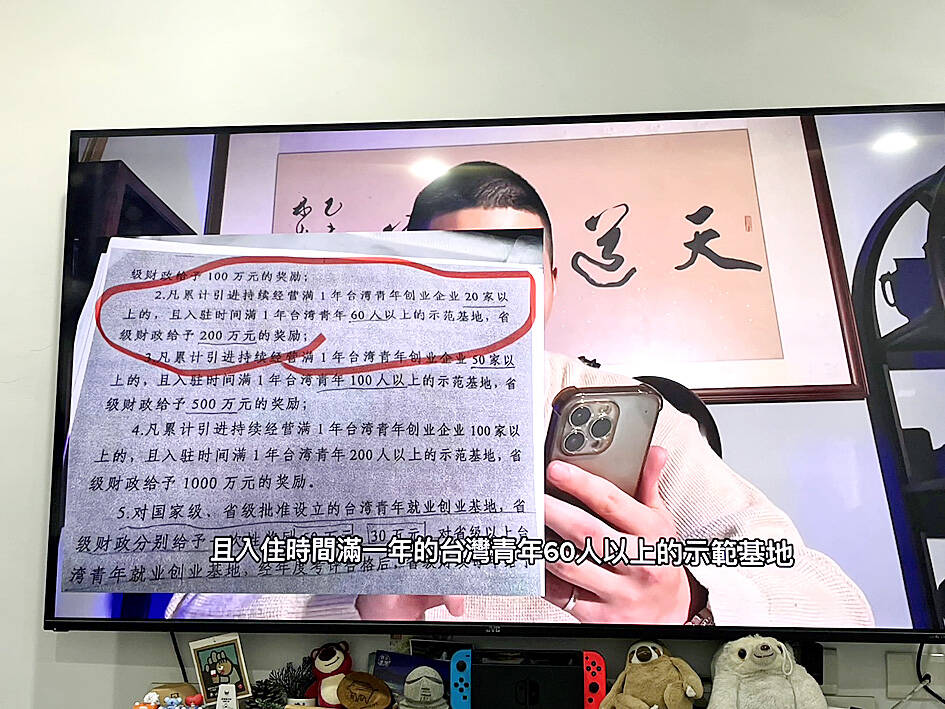Taiwanese rapper Chen Po-yuan (陳柏源) has revealed a document purported to be from within the Chinese Communist Party (CCP) describing a program to offer cash rewards to people who act as an intermediary to recruit Taiwanese to open businesses in China’s Fujian Province.
On Sunday night, Chen, whose stage name is Mannam PYC (閩南狼), posted a video on YouTube in which he described how Taiwan Youth Entrepreneurship Park head Lin Jincheng (林金城) allegedly earned up to 2 million yuan (US$273,418) by acting as an intermediary for the CCP to recruit Taiwanese for the park in Quanzhou in China’s Fujian Province.
The video is part of a series of videos that Chen and Taiwanese YouTuber Pa Chiung (八炯) have been releasing since last month on China’s “united front” tactics.

Photo: Screen grab from Chen Po-yuan’s YouTube channel
In one of the earlier videos, Lin told Pa and Chen that Taiwanese could apply for China’s national citizen identification card to register a company in the country and start a cross-border e-commerce business, purchase property or obtain bank loans.
In his latest video, Chen showed documents provided by Lin that detailed how a person could be rewarded for their recruiting efforts.
If a person recruited more than 20 businesses to open in Fujian and operate for at least a year, or if they convinced 60 Taiwanese to station at the park for a year, they would receive 2 million yuan.
If a person recruited 50 new businesses to the province or 100 or more people for the park, the bonus would increase to 5 million yuan.
In related news, a senior Taiwanese official said China’s efforts to entice more Taiwanese to get permits to live and work in China is prompting concern in Taipei that Beijing could be laying the groundwork to justify intervention in Taiwan’s affairs.
China’s efforts to promote the residence permit have intensified in the past few months, especially when it comes to targeting Taiwanese wo have never traveled to China, said the official, who asked not to be identified discussing a sensitive matter.
Taiwanese officials are concerned holders of the permit would be easier to convince to apply for a Chinese ID card and to swap their passports for those issued by Beijing, the official said.
They worry that could in turn be used by the Chinese government to justify the need to “protect Chinese citizens” in Taiwan, the official said.
In 2018, Beijing introduced the residence permit specifically for people from Taiwan, Hong Kong and Macau to make it easier for holders to live and work in China. The permit also grants access to financial services and social benefits, and can be obtained without those from Taiwan having to renounce their Taiwanese citizenship.

A magnitude 7.0 earthquake struck off Yilan at 11:05pm yesterday, the Central Weather Administration (CWA) said. The epicenter was located at sea, about 32.3km east of Yilan County Hall, at a depth of 72.8km, CWA data showed There were no immediate reports of damage. The intensity of the quake, which gauges the actual effect of a seismic event, measured 4 in Yilan County area on Taiwan’s seven-tier intensity scale, the data showed. It measured 4 in other parts of eastern, northern and central Taiwan as well as Tainan, and 3 in Kaohsiung and Pingtung County, and 2 in Lienchiang and Penghu counties and 1

A car bomb killed a senior Russian general in southern Moscow yesterday morning, the latest high-profile army figure to be blown up in a blast that came just hours after Russian and Ukrainian delegates held separate talks in Miami on a plan to end the war. Kyiv has not commented on the incident, but Russian investigators said they were probing whether the blast was “linked” to “Ukrainian special forces.” The attack was similar to other assassinations of generals and pro-war figures that have either been claimed, or are widely believed to have been orchestrated, by Ukraine. Russian Lieutenant General Fanil Sarvarov, 56, head

FOREIGN INTERFERENCE: Beijing would likely intensify public opinion warfare in next year’s local elections to prevent Lai from getting re-elected, the ‘Yomiuri Shimbun’ said Internal documents from a Chinese artificial intelligence (AI) company indicated that China has been using the technology to intervene in foreign elections, including propaganda targeting Taiwan’s local elections next year and presidential elections in 2028, a Japanese newspaper reported yesterday. The Institute of National Security of Vanderbilt University obtained nearly 400 pages of documents from GoLaxy, a company with ties to the Chinese government, and found evidence that it had apparently deployed sophisticated, AI-driven propaganda campaigns in Hong Kong and Taiwan to shape public opinion, the Yomiuri Shimbun reported. GoLaxy provides insights, situation analysis and public opinion-shaping technology by conducting network surveillance

‘POLITICAL GAME’: DPP lawmakers said the motion would not meet the legislative threshold needed, and accused the KMT and the TPP of trivializing the Constitution The Legislative Yuan yesterday approved a motion to initiate impeachment proceedings against President William Lai (賴清德), saying he had undermined Taiwan’s constitutional order and democracy. The motion was approved 61-50 by lawmakers from the main opposition Chinese Nationalist Party (KMT) and the smaller Taiwan People’s Party (TPP), who together hold a legislative majority. Under the motion, a roll call vote for impeachment would be held on May 19 next year, after various hearings are held and Lai is given the chance to defend himself. The move came after Lai on Monday last week did not promulgate an amendment passed by the legislature that